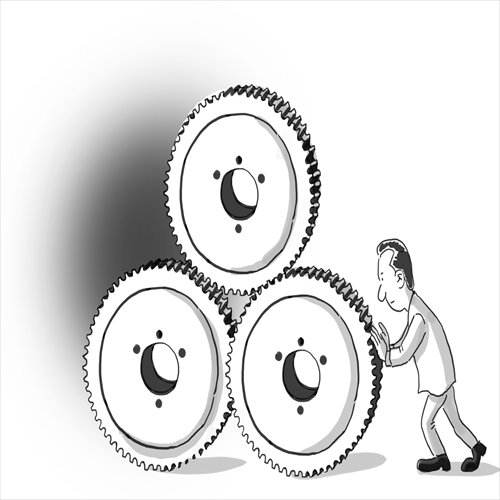


Illustration: Liu Rui/GT
The three-way relationship between China, South Korea and Japan is highly dynamic, steered by multiple factors. However, unfortunately, due to the lingering problems with economic reciprocity, political mutual trust, historical understandings and tripartite cooperation, their interactions are spiraling downward, a trajectory all parties involved are trying to reverse as soon as possible.
Political antagonisms characterized as China vs Japan and Japan vs South Korea are directly caused by disputes over territory and security. However, behind it all lie conflicting understandings of WWII.
Japan's flip-flop on historical issues happened in the 1990s when its asset bubble burst and the Japanese economy entered a prolonged slump. When its economy was strong before that period, Japan maintained a relatively responsible attitude toward its WWII atrocities and insisting on peaceful development, which triggered rapid economic growth and elevated its international prestige.
However, after its economic bubble burst, the Japanese economy failed to recover from depression soon. Consequently, the country began to revise its conclusions about the past, forsaking both its responsibilities and a peaceful road to development. Japan has found it difficult to recover from economic limbo, and its international reputation has worsened.
China-Japan-South Korea relations have been compromised by the political faceoff between China and Japan, as well as between Japan and South Korea. Bilateral confrontations should be relaxed by a new three-party cooperative mechanism.
However, the mechanism cannot be launched without Japan taking the first step to amend its China and South Korea policies. In order to get the bilateral relationship back on track, Tokyo has to reaffirm that it stands by the four-point agreement released by Chinese and Japanese leaders at the APEC summit in 2014 in Beijing. In this way can a three-way summit meeting among top leaders be resumed and the current tensions be soothed.
Meanwhile, in order to deepen the three-party ties, China and South Korea need to reinforce their coordination. The Sino-South Korean relationship has gained momentum in recent years and is in the best period of development in its history. Concerted actions by Seoul and Beijing in regional affairs, to some extent, could compel Tokyo to reassess its headstrong strategies toward China and South Korea.
China and South Korea also need to deepen their cooperation in many spheres. Strengthened cooperation between the two nations can have a positive impact on their relations with Japan and diminish competition with Tokyo. This will help ease the tensions in their relations with Japan.
The three-way relationship is also influenced by some other factors, including national interests, international duties and the involvement of external forces such as the US. These factors must be included in this new cooperative mechanism so that the tripartite relationship can be promoted.
The author is vice-director of Trilateral Cooperation Studies Center and vice-president of China Foreign Affairs University.
 J-11 fighters in air exercise
J-11 fighters in air exercise Beauties dancing on the rings
Beauties dancing on the rings Attendants-to-be join Mr. & Miss Campus Contest
Attendants-to-be join Mr. & Miss Campus Contest Beijing's toughest anti-smoking law takes effect
Beijing's toughest anti-smoking law takes effect Family lives in cave for about 50 years in SW China
Family lives in cave for about 50 years in SW China PLA soldiers operating vehicle-mounted guns in drill
PLA soldiers operating vehicle-mounted guns in drill Blind carpenter in E China's Jiangxi
Blind carpenter in E China's Jiangxi China hosts overseas disaster relief exercise for the first time
China hosts overseas disaster relief exercise for the first time 20 pairs of twins who will become flight attendants in Sichuan
20 pairs of twins who will become flight attendants in Sichuan Obama is sowing discontent in S.China Sea
Obama is sowing discontent in S.China Sea Rescuers work through night to reach cruise ship survivors
Rescuers work through night to reach cruise ship survivors Driving through limbo
Driving through limbo Facing down MERS
Facing down MERSDay|Week